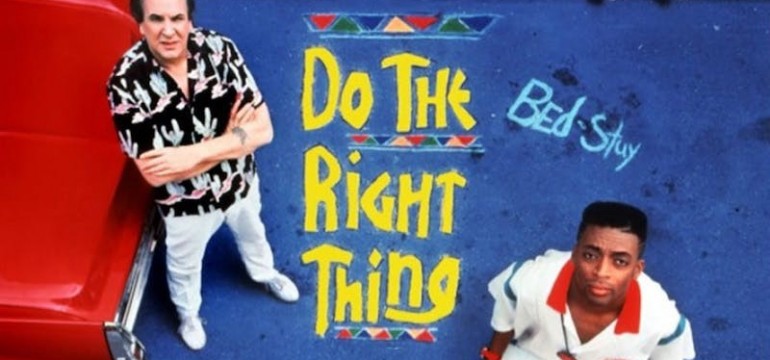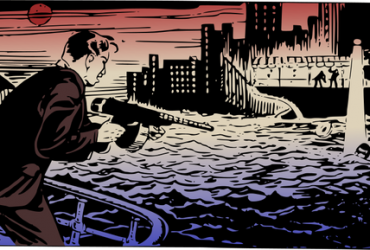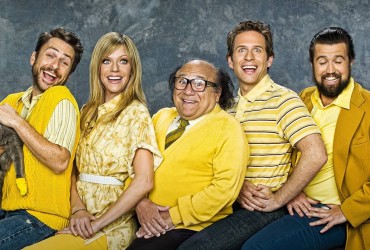In this crucial day and age where the Black population of the United States is under attack by the very institutions created to serve and protect all of us, we would do well to remember the words of Fyodor Dostoevsky:
“A society should be judged not by how it treats its outstanding citizens but by how it treats its criminals.”
Many of those killed at the hands of the police have been in custody at the time, essentially making them “prisoners” or alleged “criminals,” but not all (Breonna Taylor was shot 8 times while sleeping when the police invaded her home, the wrong home, by permission of a no-knock warrant against an entirely different individual). In any case, no matter the circumstances, the amount of force and brutality used against these individuals amounts to cruel and unusual – something that has been represented in film by independent filmmakers including Spike Lee, and in literature by Dostoevsky and others.
Do the Right Thing
This month will see the 31st anniversary of Spike Lee’s Do the Right Thing. The film is considered Lee’s seminal “joint” at this point in his career. It was only his third film as an independent filmmaker, and it debuted to high controversy at Cannes. It failed to take home a single win—there, or at the Academy Awards following its studio release. Some of the film’s critical response, although praiseworthy, predicted dire consequences for the controversy itself: David Denby of The New Yorker predicted the film would lead to riots, and that Spike Lee was “playing with dynamite in an urban playground” and he’d be responsible if “audiences go wild.”
A quick summary of the film from Indiewire.com: “Set on the hottest day of the summer, the film stars Lee himself as Mookie, who works at neighborhood pizzeria Sal’s Famous, owned, as you might expect, by Sal (Danny Aiello). Sal’s a good guy, and his son Vito (Richard Edson) is friends with Mookie, but elder son Pino (John Turturro) holds much of black community around him in contempt. Things start to come to a head after Buggin’ Out (Giancarlo Esposito) fights with Sal over the lack of black faces on his Wall Of Fame, which starts a conflict that will end with tragic consequences.”
Spoilers ahead: Those tragic consequences happen to be the death of (unarmed) Radio Raheem at the hands of the neighborhood police. (I know. Sounds depressingly familiar.) In response, Mookie takes matters into his own hands and “does the right thing:” he leads an attack against the property of Sal’s Famous Pizzeria, and the establishment burns to the ground.
Do the Right Thing was released over 30 years ago, on June 30th, 1989. And the appalling, abhorrent, and inexcusable way in which our society treats its criminals (added to the justification and even responsibility of those targeted to fight back) is the central theme of the story.
Sadly, that theme wasn’t new in 1989. It reflected exactly what many groups and neighborhoods were experiencing in day-to-day life at the time – experiences that have not only continued, but worsened ever since. The current climate of police brutality is a testament to the fact that when it comes to being judged as a society, we have miles to go.

Petrashevsky Circle’s members going through an ‘execution ritual’, an example of a mock execution. St. Petersburg, Semionov-Plaz, 1849. B. Pokrovsky’s drawing
Dostoevsky and The Petrashevsky Circle
Dostoyevsky came by his beliefs about fair treatment of the criminal population 100% honestly: In 1849, he and 34 other members of the Russian literary discussion group the Petrashevsky Circle were arrested for reading, writing, or even listening to stories that were critical of the Russian government, armed forces, and Tsar Nicholas I. The arrest was only the beginning of years of torture for their “crimes.”
Dostoevsky and his fellow book club members served 8 months in prison for their alleged anti-Tsarist activity. Then, they were pardoned by the Tsarist regime. The next day, in order to announce the good news to the prisoners, all 35 of them were marched out to the public square in their shackles. The prisoners were told that they were to be executed for their crimes. They were all taken up to the platform, the firing squad was prepared, and at the last minute the good news was revealed: Just kidding! You won’t be executed, you’ll be pardoned! (And this was supposed to be a gift from the Tsar.)
Dostoevsky then (even after his pardon) served four years’ hard labor in a Siberian prison camp, shackled hand and foot the entire time, after being “saved” from execution.
The trauma, of course, haunted him the rest of his life. It influenced many of his writings, including The Idiot, Crime and Punishment, and any number of criminal justice scenes in other stories; arrest, trial, and/or sentencing play a part in most of Dostoevsky’s works. And he was a lifelong advocate for fair, equitable, and reasonable treatment of criminals – of those taken into custody by the police, and the ways in which they were treated afterward.
Anyone who has seen, heard, or participated in a Black Lives Matter protest against the deaths of George Floyd, Rayshard Brooks, Trayvon Martin, Breonna Taylor, Michael Brown, Freddie Gray, Tamir Rice, David McAtee, Eric Garner… and countless others who have died at the hands of American police knows that, by Dostoevsky’s and any other reasonable human being’s standards, we have failed miserably as a society.







Leave a Reply